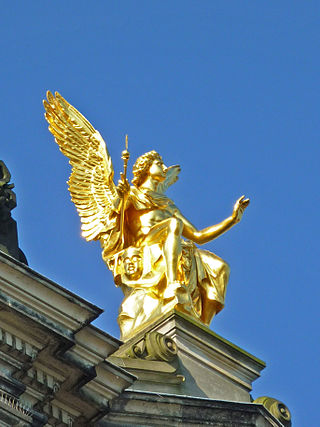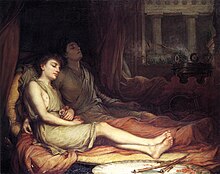
In Greek mythology, Hypnos, also spelled Hypnus, is the personification of sleep. The Roman equivalent is Somnus. His name is the origin of the word hypnosis. Pausanias wrote that Hypnos was the dearest friend of the Muses.
In Greek mythology, Lethe was one of the rivers of the underworld of Hades. Also known as the Amelēs potamos, the Lethe flowed around the cave of Hypnos and through the Underworld where all those who drank from it experienced complete forgetfulness. The river was often associated with Lethe, the personification of forgetfulness and oblivion, who was the daughter of Eris (Strife).

In Greek mythology, Styx, also called the River Styx, is a goddess and one of the rivers of the Greek Underworld. Her parents were the Titans Oceanus and Tethys, and she was the wife of the Titan Pallas and the mother of Zelus, Nike, Kratos, and Bia. She sided with Zeus in his war against the Titans, and because of this, to honor her, Zeus decreed that the solemn oaths of the gods be sworn by the water of Styx.

In Greek mythology, Alcyone and Ceyx were a wife and husband who incurred the wrath of the god Zeus for their romantic hubris.

In Greek mythology, Peneus was a Thessalian river god, one of the three thousand Rivers (Potamoi), a child of Oceanus and Tethys.
In Greek mythology, Erebus, or Erebos, is the personification of darkness. In Hesiod's Theogony, he is the offspring of Chaos, and the father of Aether and Hemera (Day) by Nyx (Night); in other Greek cosmogonies, he is the father of Aether, Eros, and Metis, or the first ruler of the gods. In genealogies given by Roman authors, he begets a large progeny of personifications upon Nox, while in an Orphic theogony, he is the offspring of Chronos (Time).
Eurytion or Eurythion (Εὐρυθίων) was a name attributed to several individuals in Greek mythology:

In Greek mythology, Nyx is the goddess and personification of the night. In Hesiod's Theogony, she is the offspring of Chaos, and the mother of Aether and Hemera (Day) by Erebus (Darkness). By herself, she produces a brood of children which are mainly personifications of primarily negative forces. She features in a number of early cosmogonies, which place her as one of the first deities to exist. In the works of poets and playwrights, she lives at the ends of the Earth, and is often described as a black-robed goddess who drives through the sky in a chariot pulled by horses. In the Iliad, Homer relates that even Zeus fears to displease her.

In Greek mythology, dreams were sometimes personified as Oneiros or Oneiroi. In the Iliad of Homer, Zeus sends an Oneiros to appear to Agamemnon in a dream, while in Hesiod's Theogony, the Oneiroi are the sons of Nyx (Night), and brothers of Hypnos (Sleep).
In Ovid's Metamorphoses, Phobetor, so called by men, or Icelos, so called by the gods, is one of the thousand sons of Somnus (Sleep). He appeared in dreams "in the form of beast or bird or the long serpent".

In Ovid's Metamorphoses, Phantasos is one of the thousand sons of Somnus (Sleep). He appeared in dreams in the form of inanimate objects, putting on "deceptive shapes of earth, rocks, water, trees, all lifeless things".
In Greek mythology, Thaumas or Thaumant was a sea god, son of Pontus and Gaia, and the full brother of Nereus, Phorcys, Ceto and Eurybia.
In Greek mythology, the name Butes referred to several different people.

In ancient Greek religion and mythology, Iris is a daughter of the gods Thaumas and Electra, the personification of the rainbow and messenger of the gods, a servant to the Olympians and especially Queen Hera.

Morpheus is a god associated with sleep and dreams. In Ovid's Metamorphoses he is the son of Somnus and appears in dreams in human form. From the Middle Ages, the name began to stand more generally for the god of dreams, or of sleep.
In Greek mythology, Aergia is the personification of sloth, idleness, indolence and laziness. She is the translation of the Latin Socordia, or Ignavia: the name was translated into Greek because Hyginus mentioned her being based on a Greek source, and thus she can be considered as both a Greek and Roman goddess. Aergia's opposite character is Horme, a goddess of effort.
In Greek mythology, Hippasus or Hippasos is the name of fourteen characters.
In Greek mythology, the name Abas is attributed to several individuals:

In Greek mythology, the Hecatoncheires, also called Hundred-Handers or Centimanes, were three monstrous giants, of enormous size and strength, each with fifty heads and one hundred arms. They were individually named Cottus, Briareus and Gyges. In the standard tradition, they were the offspring of Uranus (Sky) and of Gaia (Earth), and helped Zeus and the Olympians to overthrow the Titans in the Titanomachy.

In Greek mythology, the Land of dreams is a location in the Greek underworld mentioned by Homer in the Odyssey. Homer locates the land past the streams of Oceanus, the world-encircling river, and the gates of the Sun, close to the Fields of Asphodel, where the spirits of the dead reside. Described as "the land where reality ends and everything is fabulous", the district of dreams is situated by the stream of Oceanus, the physical boundary in cosmic space, beyond which lies the realm of images and ghosts.












